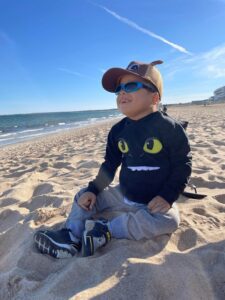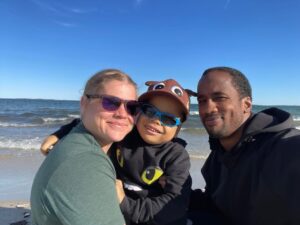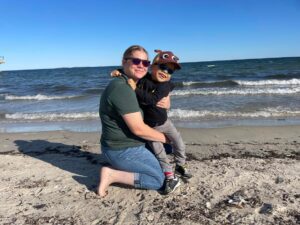Rare Community Profiles

Rare Community Profiles is a new Patient Worthy article series of long-form interviews featuring various stakeholders in the rare disease community, such as patients, their families, advocates, scientists, and more.
How Dixie Commits to Supporting her Son and the MSMDS Community
A few weeks before her son’s birth, Dixie Anderson’s doctor looked at her and said:
“You should be preparing for a funeral, not a birth.”
Her pregnancy had certainly not been easy leading up to this point. At the 13-week anatomy scan, the doctor noticed that her son’s bladder was too large. His bladder kept growing to the point where it held 3x the amount of liquid as an adult bladder; it needed to be drained in utero three times. Every time Dixie returned, there was a new issue: lungs not developing correctly, heart defects, kidney failure.
But something inside Dixie told her that she needed to fight for her son. He was born six weeks early via C-section, with an aortic coarctation and patent ductus arteriosus (PDA), a heart defect. Although he has stage IV kidney disease now, at five years old, his kidneys have worked at 100% since birth. At two weeks old, Dixie’s son underwent heart surgery to fix the defects.

After surgery, doctors realized that his pupils were fixed and dilated. Was it medication? A stroke? Scrambling for answers, Dixie dove into research. She found a medical research paper about an ultra-rare condition called multisystemic smooth muscle dysfunction syndrome (MSMDS); only five people were included in the research. One of the symptoms: pupils that cannot constrict with light.
Dixie soon came back to the doctors, convinced that her son had MSMDS. After convincing the doctors to perform genetic testing, Dixie’s son was officially diagnosed at three months old. He was around the 30th person in the world diagnosed with this condition.
Dixie recently shared her son’s story with Patient Worthy, discussing what multisystemic smooth muscle dysfunction syndrome is, how to manage an ultra-rare condition, and why she and her husband co-created the ACTA2 Alliance.
What is Multisystemic Smooth Muscle Dysfunction Syndrome (MSMDS)?
Multisystemic smooth muscle dysfunction syndrome (MSMDS) is an ultra-rare, progressive, and terminal disease caused primarily by ACTA2.R179H gene mutations. However, shares the ACTA2 Alliance, ACTA2.R179C mutations have also been identified. When Dixie describes MSMDS, she shares:
“MSMDS is similar to muscular dystrophy relating to everything smooth muscle and involuntary in the body. So it impacts pupil constriction, temperature regulation, and blood pressure regulation. It prevents the bladder from emptying adequately. It’s associated with heart and lung disease, no gut motility, visual and hearing deficits, blood vessel issues, and an increased susceptibility to strokes because the arteries and veins can’t constrict. Those affected have an aortic rupture by the time they are teenagers if not repaired.”
In her son’s case, his entire body is affected. He can walk, but not long distances. He has a wheelchair for community ambulation. Her son also has a tracheostomy, a G-tube, and a suprapubic catheter since his bladder is unable to drain on its own. Dixie further explains:
“He takes fourteen medicines twice a day. We also manage his G-tube feeds, so he has six total big feeds throughout the day, and he always has to be with his nurse if he’s not with his parents. Because his disease is so rare, we cannot leave him with a babysitter. His nurse goes to school with him full-time. If he complains of a headache, it could be a headache or an arterial rupture, so we always have to be prepared. As a parent, you’re always waiting for the other shoe to drop.”
Learning about the Condition
Although Dixie and her husband are now better versed on MSMDS, they felt alone and isolated at the beginning of their journey. None of their doctors knew anything about the condition. There was only one other case in the state. Dixie reached out to the researchers in Texas who created the study and asked for help. They shared an unpublished paper on 30 people with MSMDS with the doctors, who were concerned that Dixie’s son was worsening. The Anderson family tried to transfer their son to Boston Children’s Hospital, but they wouldn’t take him.
Then, through a Facebook group, Dixie found a physician who was beginning to study MSMDS in Massachusetts. She reached out and the physician said, “If we can get him here, we think we can help him.” In just three weeks, her son was on a medi-flight to Mass General.
Dixie’s son spent the first 26 months of his life in the hospital: eight months in the NICU, five in the PICU, and the remainder in a step-down unit in Boston. Says Dixie:
“He was discharged at 26 months and then COVID-19 happened. Now, he’s five years old and just really now starting to see what other kids do. But everything we do with him is a calculated risk. In the last few months, he’s had three hospital stays for rhinovirus. It only takes one lung virus before we’re in a completely different situation. We’ve, multiple times, stood by his bed with palliative care thinking about final options.”
Then, with a pause and a laugh, Dixie says:
“With all of this going on, you’d be amazed to see him trying to climb the cat tree right now.”
Facing the Unknown
Currently, Dixie’s son enjoys hanging out with his older brother, going to school, and spending time with his parents. Dixie’s husband is active-duty Air Force and Dixie works full-time, so her son is also cared for by the nurse. Because he is so rare, the family cannot travel more than thirty minutes outside of the hospital’s vicinity.

Most individuals with MSMDS do not live past their early to mid-20s. But this means that Dixie and her family don’t know how long their son will be with them, or where life will take them. In November 2022, her son was blue and unresponsive; Dixie and her husband performed 20 minutes of CPR while waiting for the paramedics. Says Dixie:
“That night in the hospital, I was talking to one of his doctors. For the first time, she indicated that we might not make it in time to a cure for him. Miraculously, he had an amazing comeback and no lasting damage. But it was really terrifying. People ask me a lot how I do this. How I deal with these situations. We try to understand that he’s not ours to keep. It’s a hard thing to say and understand. But if he died today, I have zero doubts that his purpose on this earth was served. Because he made it to Mass General, there is now a team that manages over 50% of the MSMDS cases worldwide. His journey has brought resources and hope to so many families. Even if we don’t get to keep him forever, he’s served a great purpose here so far, and that brings me comfort.”
Forming the ACTA2 Alliance
Four years ago, Dixie, her husband, and a few other families launched the ACTA2 Alliance, a nonprofit organization to spread MSMDS awareness and advance research in this field. They also created the Young Genetic Stroke Alliance, both of which work toward patient advocacy and funding research in this rare disease.
Recently, the ACTA2 Alliance held its first conference to bring together families, doctors, and researchers. Dixie’s son was hospitalized at the time, so he wasn’t able to attend, but the second conference will be held in Boston in May 2023. The two-day agenda includes everything known about MSMDS, its relation to different subsystems of the body, and research on neurology, pulmonology, and urodynamics.
Dixie believes that some of the most imperative research will center around developing a gene therapy cure. It may be a challenge; rare disease drug development is often a difficult space, as many researchers want to focus on larger or more common diseases. But as the MSMDS community has doubled in size since Dixie’s son’s diagnosis, continued growth may spur increased interest into research.
Outside of research and fundraising, the ACTA2 Alliance focuses on raising awareness, providing support, and encouraging advocacy. Dixie shares:
“We help patients find the necessary resources to identify doctors in their state or country who may have MSMDS experience. We also work to connect them to the team at Mass General. In our own community, we’ve gone back to our original physicians and identified the main symptoms of this disease, advocating for early testing if they note this in any infants. I’ve heard several stories of families who found our website or Facebook page, realized it was their disease, and were able to get diagnoses just after birth. Spreading this information can change lives.”
A Story of Hope
When Dixie thinks back on her experience so far, emotions flood in. She remembers how the doctor cried when giving her the results, how Dixie knew the diagnosis would be right, but she was praying it was wrong. How, in one moment, life changed: her son had a life-limiting illness. But mixed with fear comes hope and comfort:
“I’ll never forget how much the doctor cared. We were so alone. There was nobody else. Nobody heard of MSMDS. There were no resources. The doctors didn’t know what to do. Over the last five years, I’ve looked at people and thought, ‘You’ll never understand what it is like.’ Those things change you. Those experiences become part of who you are. But I knew that I could use them for strength. And I knew that I could lean into the rare disease community, which has just been so priceless. I want other families to know not to give up. Keep raising your voice and moving forward. You’re not alone. You have resources. You can make a difference.”

To Dixie, her son’s story is sad and she doesn’t know how it ends yet. But more than everything else, she views his story as one of success. She shares:
“I never imagined that our lives would turn out like this. But our diagnosis helped our community have resources and pushed us to the point where we might find a treatment or a cure. To other families, there is power in your story to make a change. Think of my son and realize that his story is one of taking tragedy and using it to move forward.”


